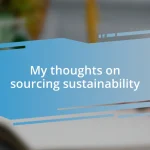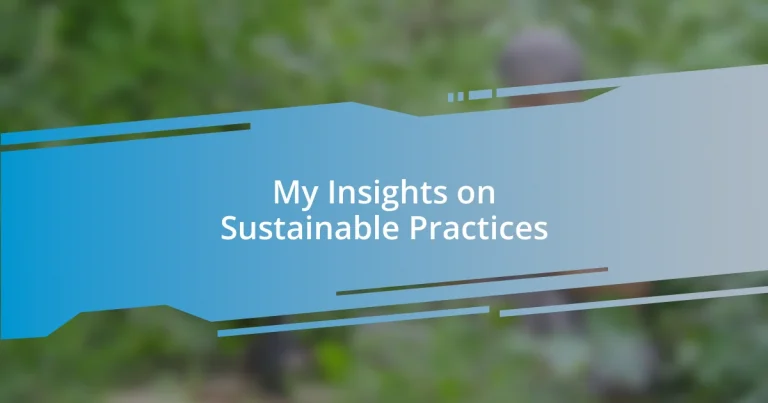Key takeaways:
- Sustainable practices emphasize making conscious choices that benefit the environment, health, and economy, highlighting the interconnectedness of our actions.
- Implementing small changes at home, such as composting and reducing plastic use, can create significant positive impacts and promote community bonding.
- Future trends in sustainability focus on technological innovation, circular economies, and conscious consumerism, reshaping market dynamics and increasing accountability among businesses.
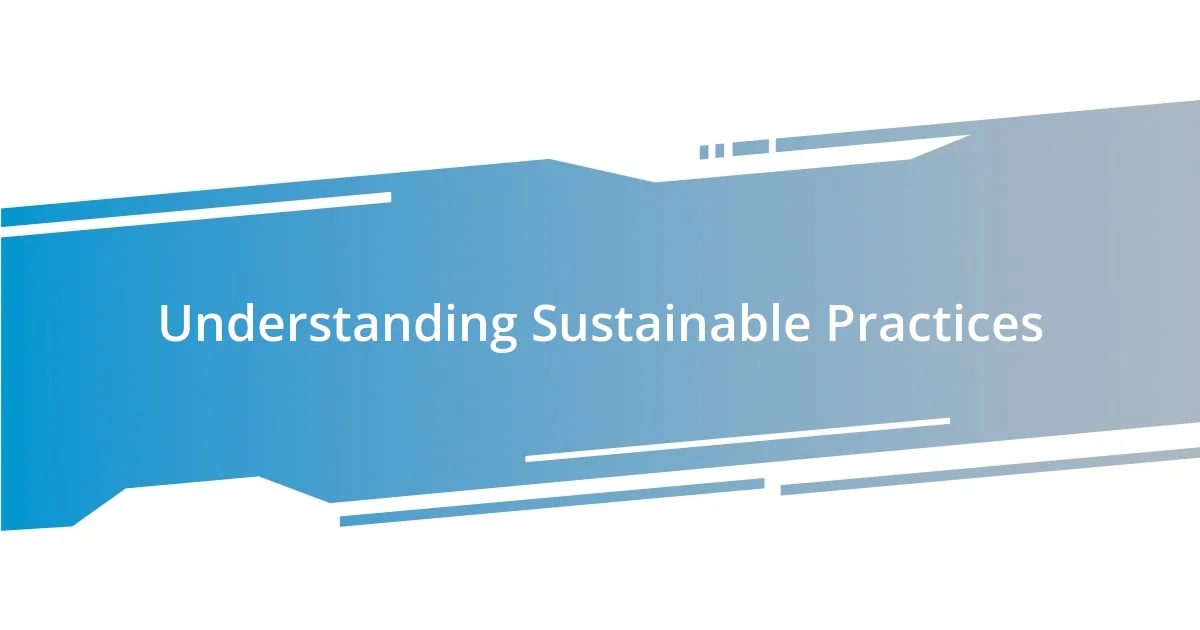
Understanding Sustainable Practices
Sustainable practices revolve around the idea of meeting our current needs without compromising the ability of future generations to meet theirs. It struck me one day while walking through my local farmers’ market, observing the vibrant colors of organic veggies and the pride of the farmers selling them. Have you ever thought about how much healthier our planet could be if we all made more conscious choices in our daily lives?
At its core, sustainability is about balance. For instance, when I started my small garden, I felt a profound connection to the earth. I learned to appreciate the cycles of nature, like composting kitchen scraps and watching them transform into nutrient-rich soil. Isn’t it remarkable how something so simple can have such a big impact on our ecosystem?
Understanding sustainable practices also involves recognizing the interconnectedness of our actions. The other day, I stumbled across a documentary highlighting the consequences of fast fashion. It was both eye-opening and upsetting. What if we all took a moment to consider how our purchases affect the lives of others and the health of our planet? By shifting our buying habits towards ethical brands, we can make a difference together.
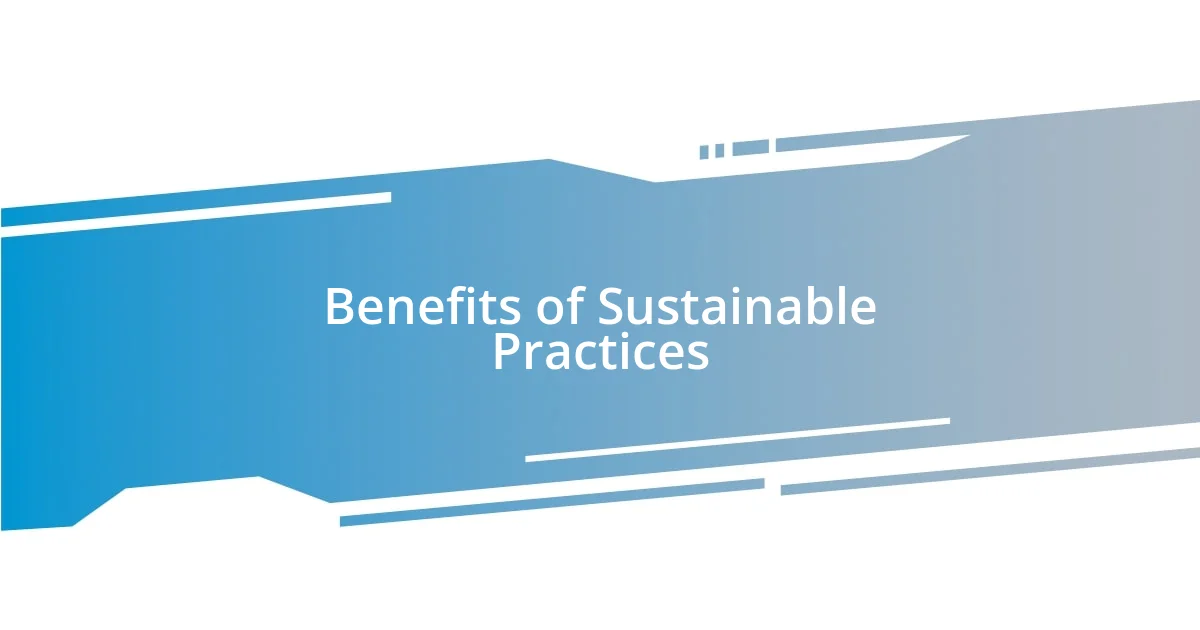
Benefits of Sustainable Practices
Sustainable practices offer a myriad of benefits, not only for the environment but for our health and economy as well. I remember when I switched to using eco-friendly products. It felt good knowing I was reducing my exposure to harmful chemicals, and I noticed an improvement in my overall well-being. Can you imagine how much better we can feel when we prioritize our health and the planet?
Economically, embracing sustainability can lead to cost savings over time. When I started using energy-efficient appliances, my utility bills decreased significantly. I was pleasantly surprised by how much I saved! This shift made me realize that green choices can be financially smart, creating a win-win situation for both our pockets and the planet.
Additionally, sustainable practices foster community growth and resilience. I’ve seen local projects, like community gardens, bring neighbors together, creating a sense of belonging and shared responsibility. It warms my heart to witness people unite for a common cause, knowing that the collective effort can lead to a brighter, greener future.
| Benefits | Examples |
|---|---|
| Health Improvement | Using eco-friendly products |
| Cost Savings | Energy-efficient appliances |
| Community Building | Community gardening initiatives |
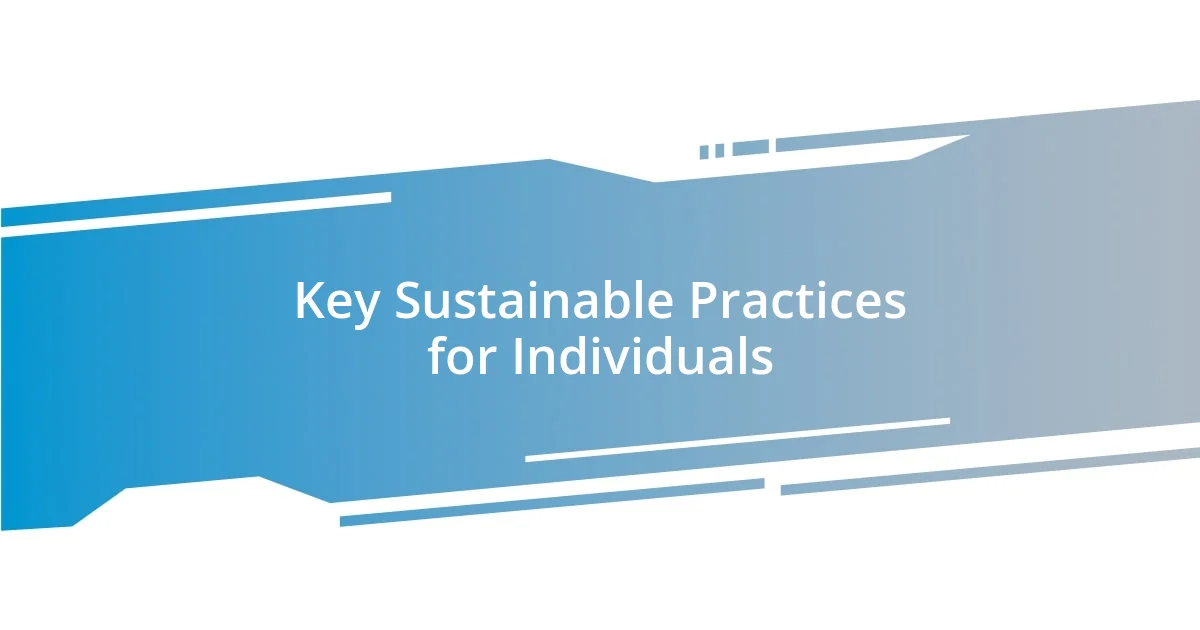
Key Sustainable Practices for Individuals
When it comes to adopting sustainable practices, every small choice can lead to a ripple effect of positive change. One of the most impactful shifts I made was reducing my single-use plastic consumption. Every time I reach for my reusable water bottle or canvas shopping bag, I feel a sense of pride knowing I’m doing my part. It’s almost like a mini victory in my day-to-day life. Small changes can build momentum, encouraging others to follow suit.
To help you get started on your own sustainable journey, here are some key practices to consider:
- Reduce, Reuse, Recycle: Aim to minimize waste by adopting these three principles.
- Conserve Water: Simple adjustments, like shorter showers or fixing leaks, can save this precious resource.
- Eat Local: Supporting local farmers not only reduces your carbon footprint but also boosts the economy.
- Adopt a Plant-Based Diet: Even just one meatless meal a week can significantly lessen environmental impact.
- Opt for Public Transport or Carpooling: Reduce your carbon emissions and meet new people while you’re at it.
I vividly recall the first time I participated in a community clean-up. The joy of picking up litter alongside my neighbors was palpable. We were not just cleaning our environment; we were bonding over a shared vision of a cleaner, greener community. Each bag of trash we collected felt like a step towards healing our planet. It’s those moments that affirm my belief that sustainable practices don’t just benefit the earth; they enrich our lives and communities too.
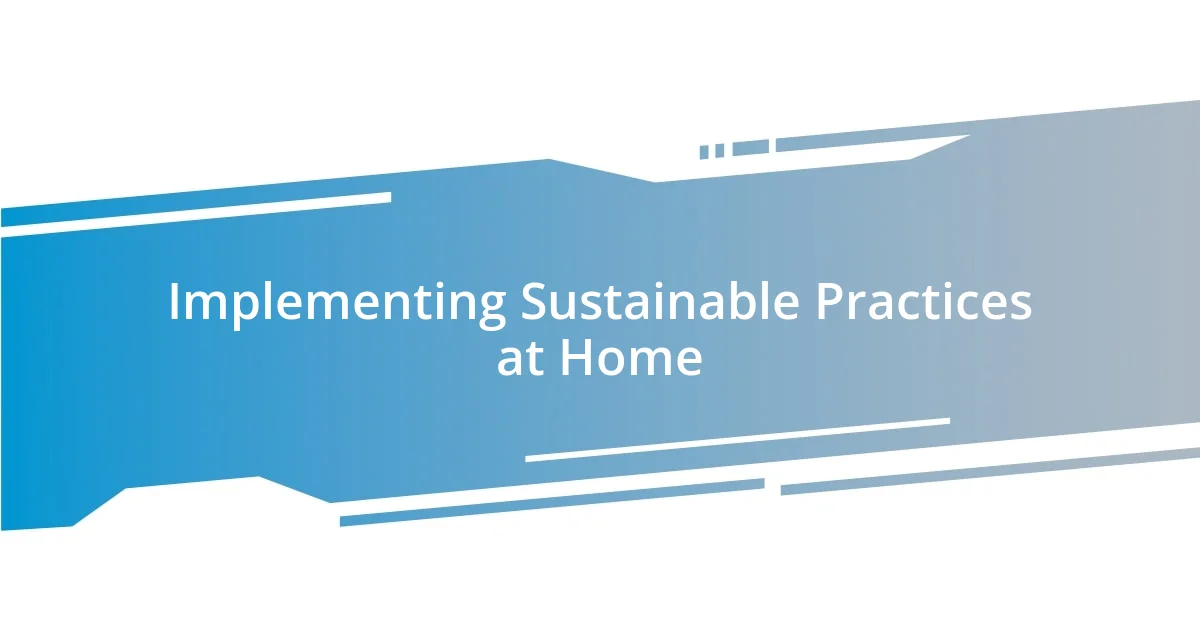
Implementing Sustainable Practices at Home
Implementing sustainable practices at home starts with small, intentional changes that can have a significant impact. For instance, I began composting last year, and it completely transformed my kitchen waste. Watching food scraps turn into nutrient-rich soil was not just satisfying — it felt like I was giving back to the earth in a tangible way.
One of the easiest practices I adopted was mindful grocery shopping. Each time I choose products with minimal packaging or buy in bulk, I sense a little thrill. Have you ever stopped to think about how our choices at the store affect the planet? It’s empowering to realize that being conscious about what I bring home can reduce waste and promote sustainability. Plus, my pantry has never been more organized!
Lastly, I’ve noticed that switching to renewable energy sources, like solar panels, has changed the entire vibe of my home. It’s freeing to know that I’m harnessing clean energy, and on sunny days, I often find myself smiling when I see my electricity meter running backward. It’s a constant reminder that I’m not only reducing my carbon footprint but also contributing to a shift toward a brighter future for everyone. What steps are you willing to take to create a positive impact in your own space?
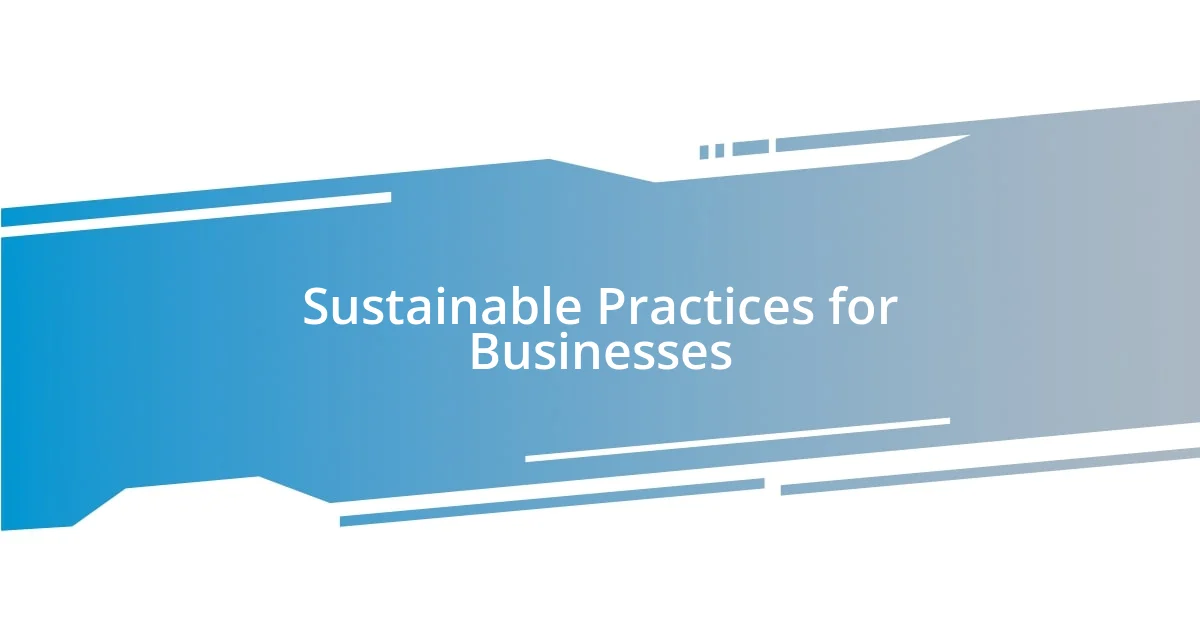
Sustainable Practices for Businesses
Sustainable practices for businesses often begin with adopting eco-friendly materials and processes. When I first joined a company that prioritized sustainable sourcing, I was pleasantly surprised to see how much of an impact it had on our overall footprint. The shift to biodegradable packaging not only resonated with our environmentally-conscious clients but also led to a sense of pride among employees. Hasn’t it always struck you how changing materials can really elevate a brand’s commitment to sustainability?
Engaging employees in sustainability initiatives is another powerful step. At my previous workplace, we launched a “green team” that focused on reducing energy consumption and promoting recycling programs. The enthusiasm among our team was palpable, and it fostered a sense of community. I remember our first office “Energy Saving Challenge,” where we tracked reductions in energy usage, making it a fun and competitive goal that strengthened our camaraderie. What creative ways can your team come together to embrace sustainable practices?
Furthermore, transparency in sustainability goals can greatly enhance a business’s reputation. I’ve seen how sharing our journey toward sustainability with customers built trust and loyalty. When we communicated not only our successes but also the challenges we faced, it fostered an authentic connection. This open dialogue makes customers feel like they are part of the solution as well, reinforcing their support for our mission. How can your business tell its sustainability story in a way that resonates deeply with your audience?
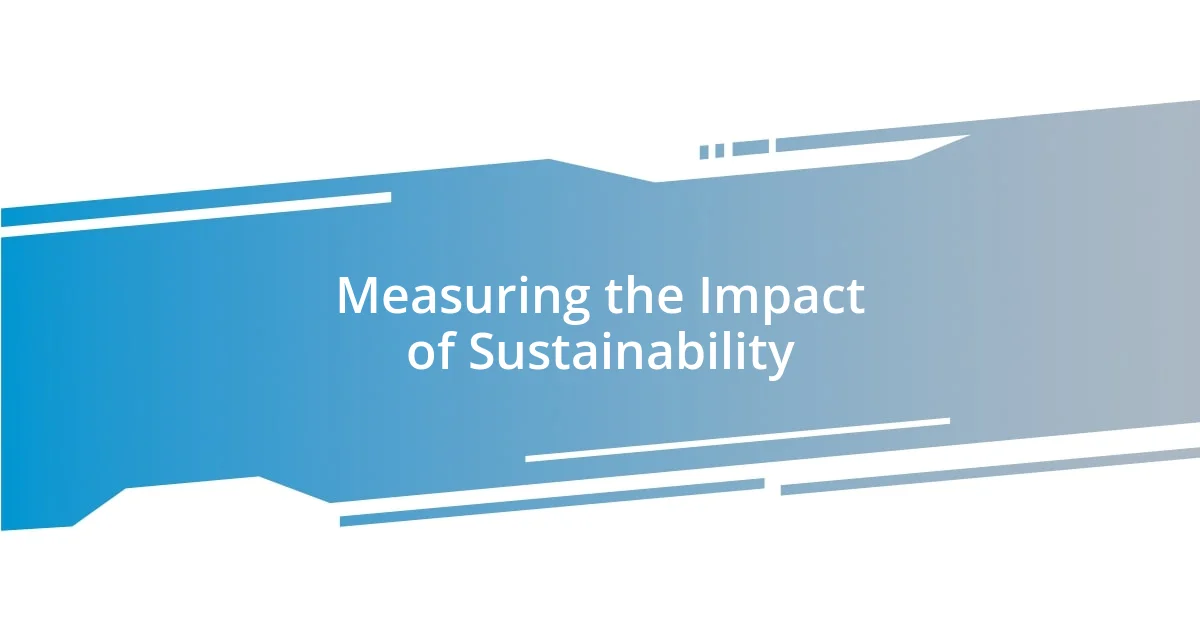
Measuring the Impact of Sustainability
Measuring the impact of sustainability can be both enlightening and challenging. I recall the first time I used a carbon footprint calculator; it was an eye-opener to see my lifestyle quantified in terms of environmental impact. Isn’t it fascinating how numbers can make abstract concepts more tangible? Gaining clarity about where I stood motivated me to set specific, actionable goals.
One effective way to assess sustainability impact is through ecological metrics, like water saved or waste diverted from landfills. The first time I tracked how much rainwater I collected for my garden, I felt a profound connection to the environment. Each liter counted brought a sense of fulfillment and highlighted how small actions contribute to a larger movement. Have you ever considered how your daily habits can collectively make a difference?
Beyond numbers, feedback from community involvement also provides insight into sustainability’s effectiveness. Participating in local clean-up events allowed me to witness the immediate results of collective action. The smiles from my neighbors and the pristine parks we restored were more than just visual satisfaction; they were a testament to the positive change we created together. How often do we pause to appreciate the direct impact of our teamwork on the local ecosystem?
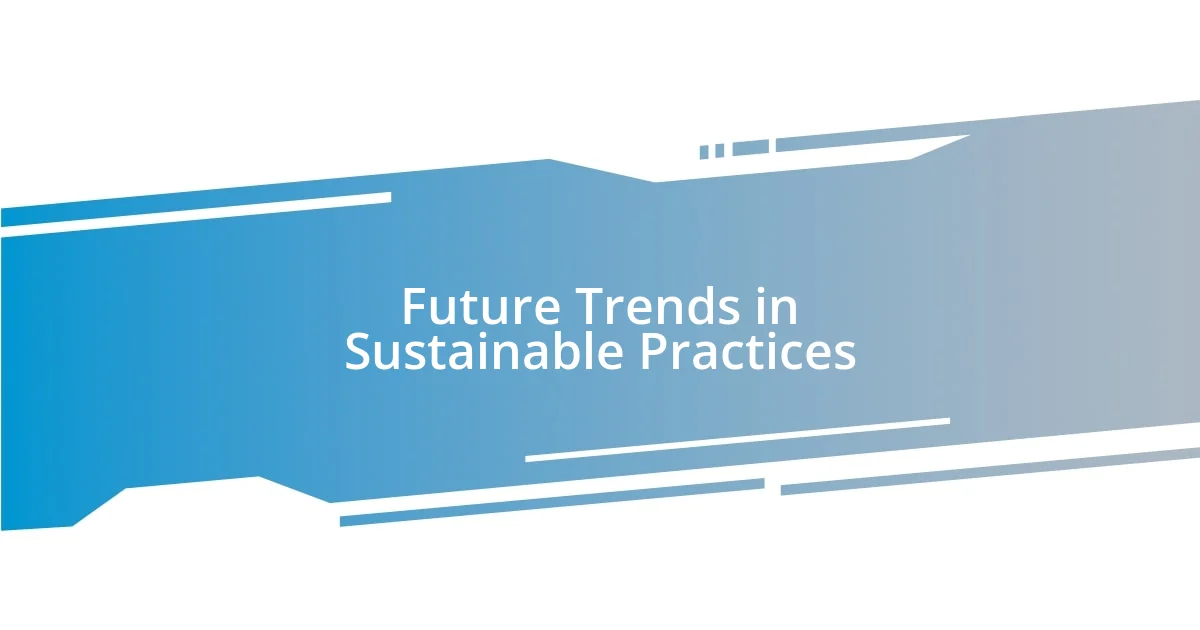
Future Trends in Sustainable Practices
Future trends in sustainable practices are increasingly focused on technology and innovation. I’ve recently encountered fascinating advancements in renewable energy, such as solar panels that can generate power even on cloudy days. Doesn’t that show how we’re pushing the boundaries of what’s possible? These technologies not only help businesses reduce their carbon footprint but also promote energy independence, which can be incredibly empowering.
In addition, the concept of a circular economy is gaining momentum, where waste is minimized, and resources are continuously recycled. I remember attending a workshop on upcycling and feeling inspired as we transformed old materials into new products. It made me realize how creative solutions can drive significant change. Could embracing this mindset be the key to a more sustainable future for all of us?
Moreover, the rise of conscious consumerism is reshaping market dynamics. It amazes me how consumers are now demanding transparency in a company’s sustainability practices. At a recent sustainable goods fair, I was struck by the number of people actively seeking brands that align with their values. Isn’t it remarkable how our collective choices can hold businesses accountable? This trend indicates a significant shift—where sustainability isn’t just a bonus but an expectation.






